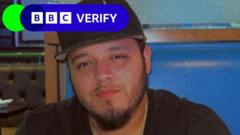As international students face increasing scrutiny and visa revocations in the US, many are experiencing heightened anxiety over their safety and status. The situation arises amidst a crackdown on pro-Palestinian activism, leading some to take precautions in anticipation of potential detentions.
Growing Tensions for International Students in the US Amid Visa Revocations

Growing Tensions for International Students in the US Amid Visa Revocations
Recent detentions and visa revocations have sparked anxiety among foreign students across US colleges, prompting fears of retaliation for political expressions.
In recent weeks, many international students in the United States have found themselves at the center of an alarming trend: the abrupt detainment by plain-clothes agents for alleged involvement in pro-Palestinian demonstrations. Footage of students being taken away in unmarked vehicles has circulated widely on social media, causing a climate of fear across campuses from major public universities to elite Ivy League institutions. The Trump administration has justified these actions by stating that visa statuses can be revoked with minimal notice and for a variety of reasons, framing it as a matter of public safety and national interest.
Reports indicate that over 1,000 foreign students and recent graduates have either seen their visas revoked or their legal statuses altered since this crackdown commenced. For many affected individuals, the rationale remains unclear; universities often discover these changes only after reviewing government databases that track students' visa statuses.
"Anyone could be next," shared a student from Georgetown University, who has taken to carrying a card detailing his constitutional rights, underscoring a palpable sense of dread among peers. Many are choosing anonymity when speaking about their experiences, fearful that their identities could draw unwanted attention from authorities.
The reasons for these visa cancellations vary significantly: while some students have been targeted due to criminal records or minor infractions, a significant proportion seems linked to their participation in protests advocating for Palestine. Secretary of State Marco Rubio noted that those identified as dangerous activists had their visas revoked, asserting, "We do it every day."
Civil liberties organizations have decried these actions, claiming they infringe on students' constitutional rights. Those detained strongly reject any affiliations with extremist groups such as Hamas, emphasizing that the real issue lies in their political expressions surrounding the Israeli-Palestinian conflict.
Visual symbols of solidarity, like "Protect Our Students" flyers at Georgetown University, have emerged as a counter-narrative to the heightened restrictions and scrutiny. Recent arrests have included individuals like Badar Khan Suri, a postdoctoral fellow at Georgetown, who was detained for alleged antisemitic activities related to his social media presence.
As fear spreads, the chilling impact of these actions is evident, with some students opting out of attending ceremonies or gatherings for fear of being targeted. Reports from Tufts University and the University of Texas indicate that students are paralyzed by the threat of ICE raids, leading many to work remotely or avoid essential outings. Observers warn that the broader implications of these policies could severely undermine academic freedom and freedom of speech on campuses across the nation.
In light of this evolving situation, student groups and faculty members are rallying to provide support to those vulnerable, offering safe spaces and resources for those facing uncertainty. The overarching sentiment is one of apprehension and resilience as the community navigates these distressing challenges that threaten not only their future in academia but also their basic rights as individuals.
Reports indicate that over 1,000 foreign students and recent graduates have either seen their visas revoked or their legal statuses altered since this crackdown commenced. For many affected individuals, the rationale remains unclear; universities often discover these changes only after reviewing government databases that track students' visa statuses.
"Anyone could be next," shared a student from Georgetown University, who has taken to carrying a card detailing his constitutional rights, underscoring a palpable sense of dread among peers. Many are choosing anonymity when speaking about their experiences, fearful that their identities could draw unwanted attention from authorities.
The reasons for these visa cancellations vary significantly: while some students have been targeted due to criminal records or minor infractions, a significant proportion seems linked to their participation in protests advocating for Palestine. Secretary of State Marco Rubio noted that those identified as dangerous activists had their visas revoked, asserting, "We do it every day."
Civil liberties organizations have decried these actions, claiming they infringe on students' constitutional rights. Those detained strongly reject any affiliations with extremist groups such as Hamas, emphasizing that the real issue lies in their political expressions surrounding the Israeli-Palestinian conflict.
Visual symbols of solidarity, like "Protect Our Students" flyers at Georgetown University, have emerged as a counter-narrative to the heightened restrictions and scrutiny. Recent arrests have included individuals like Badar Khan Suri, a postdoctoral fellow at Georgetown, who was detained for alleged antisemitic activities related to his social media presence.
As fear spreads, the chilling impact of these actions is evident, with some students opting out of attending ceremonies or gatherings for fear of being targeted. Reports from Tufts University and the University of Texas indicate that students are paralyzed by the threat of ICE raids, leading many to work remotely or avoid essential outings. Observers warn that the broader implications of these policies could severely undermine academic freedom and freedom of speech on campuses across the nation.
In light of this evolving situation, student groups and faculty members are rallying to provide support to those vulnerable, offering safe spaces and resources for those facing uncertainty. The overarching sentiment is one of apprehension and resilience as the community navigates these distressing challenges that threaten not only their future in academia but also their basic rights as individuals.



















